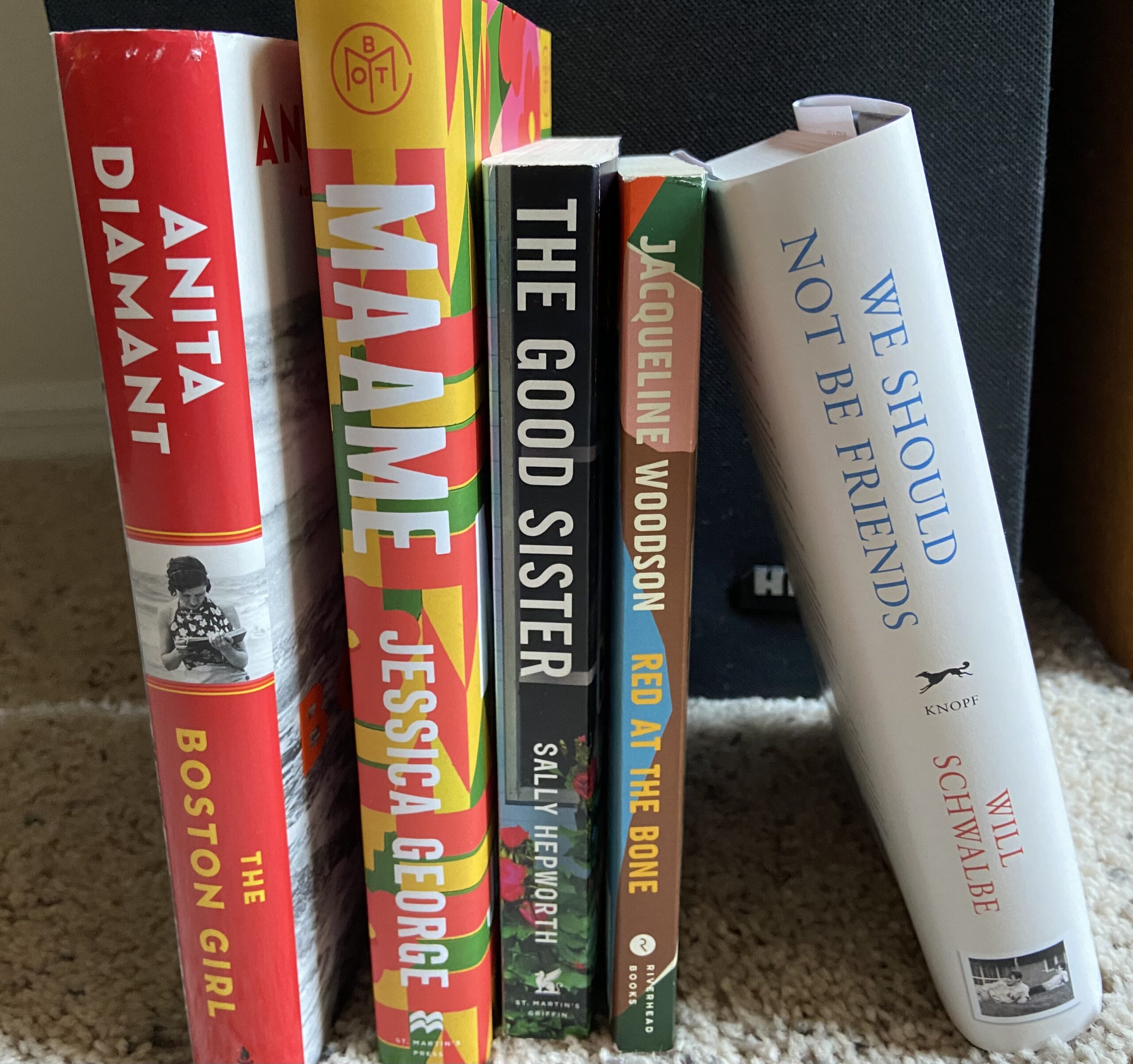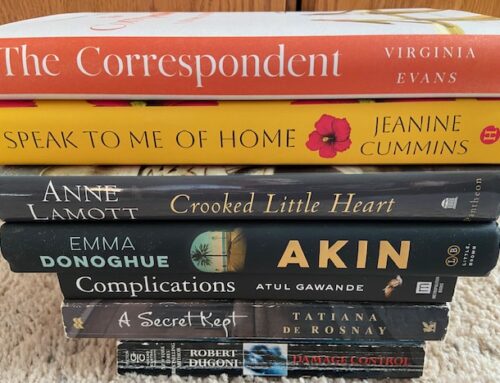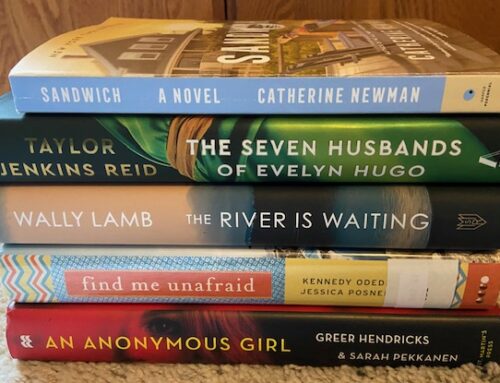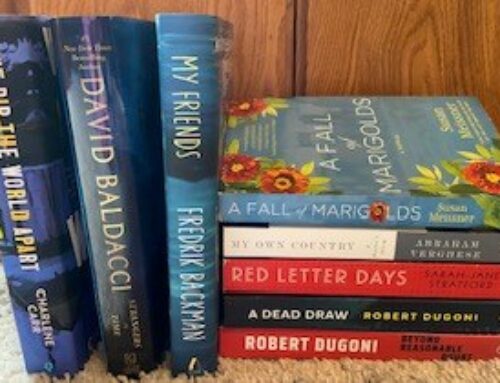Half the year is gone! But I’ve read some great (and some less great) books. Don’t worry; the list is longer than the picture shows.
Cul-De-Sac by Joy Fielding
I read a smattering of mystery/thrillers to break up my usual fiction. This one is a nice mix, primarily a character study with a mystery defined in the prologue as “all have access to guns; someone gets shot.” The characters are neighbors in a cul-de-sac, each with more serious problems than you might find in an average neighborhood. They all have access to guns. As I got to know the characters, I certainly had a couple of favorite potential targets. Good read.
The Boston Girl by Anita Diamant
At 85, a grandmother recounts her life story to her granddaughter. That story: an American-born daughter of Jewish immigrants, living and working in NYC, through WWI, the great depression, WWII. It’s a beautiful story of coming into her own, family, tradition, friendships, and love.

This is Where I Leave You by Jonathan Tropper
The exception that proves the rule: I may like the movie better than the book (and I haven’t watched the movie, but Jane Fonda and Tina Fey are in it). The setting is a shiva, observed by a most-dysfunctional family, that feels like a frat party. While working through their many dysfunctions, there is a great deal of sex, talk about sex, and more sex. According to one of the reviews, this is masterful “male psyche.” I liked the family healing part, but it nearly got lost in the sex.
The 6:20 Man by David Baldacci
I’ve long been a Baldacci fan for fun, smart mystery/thrillers, but if I wanted a change from “male psyche” (see above) this wasn’t the best choice. The plot was more convoluted, and the protagonist was less detective and more combat-skilled than usual. Baldacci always delivers a strong, fast-paced read, and this was no exception.
Red at the Bone by Jacqueline Woodson
Family saga. Racial and cultural issues. Dreams deferred and sought. Parents and children. Even a nod to the LGBQT community. This compact book packs it all in, with chapters alternating viewpoints of different characters. A heartfelt read.
A Wedding in December by Anita Shreve
Shreve’s strength is in character-driven stories. Set in December 2001, this novel takes place over a wedding weekend at a country inn. The characters were friends as teens in a boarding school, celebrating a couple who re-found one another as she is diagnosed with cancer. They share guilt over the death of another friend shortly before graduation, as well as other secrets, passions, and losses that are slowly revealed.
Demon Copperhead by Barbara Kingsolver
Pulitzer Prize. Epic story with a hero to cheer for through his journey of poverty, abuse, the foster care system, drug addiction, tragedy, and so much more. Based in Appalachia, it’s a masterpiece in socioeconomic issues. And yes, good people exist in all of this. It’s a hard, gut-wrenching read, but so worth it. I’d be remiss if I didn’t mention the soaring, evocative writing by a master wordsmith.
Hello Beautiful by Ann Napolitano
A rich, character-driven novel about families and friends, expectations, the ties that bind and unravel. It’s woven with themes of grief, mental health, resentment, and most of all, love. I didn’t relate to any one character, and there isn’t a single hero or antihero, though some characters were easier to like or understand than others. Parts of this novel were difficult; trigger warning re: attempted suicide.
I Have Some Questions for You by Rebecca Makkai
Returning to boarding school 20 years later to teach a 2-week class raises reminders of a classmate murdered and the young man convicted. The perspective for the novel is Bodie, who always felt like an outsider but is now a respected podcaster. As an adult, she realizes she probably knew more about the case than she had realized at the time. It’s an interesting exploration of what we know intuitively and what we acknowledge or address, as well as issues of inappropriate behavior by men toward female students and biases in a rush to judgment.
We Should Not be Friends by Will Schwalbe
Memoir of an unlikely friendship (outgoing jock and bookish nerd) spanning from college to AARP is an interesting take on the influence of differing personalities in the right setting, as well as male friendship, in general. As the 2 age, chronic health issues take a toll on both but also serve to deepen the relationship.
Tomorrow and Tomorrow and Tomorrow by Gabrielle Zevin
A story of friendship, love, insecurity, personal and shared trauma, all built around a culture of gaming. While the gaming language was incomprehensible to me, the core story is rich and relevant. The characters come from vastly different backgrounds and bond during childhood. While they drive and inspire one another over the years, they also fight intensely.
The Good Sister by Sally Hepworth
What starts as a quirky family drama slowly unravels to reveal some long-hidden truths. Adult fraternal twins Fern and Rose have remained physically and emotionally close, partly because of Fern’s severe sensory sensitivity and dependence on Rose. When Rose can’t get pregnant, Fern decides to have a baby to repay Rose for all her assistance. Thus starts a journey that’s both sweet and intense.
Maame by Jessica George
This is a pretty darn good first novel. It’s clearly personal and filled with emotion. 25-year-old Maddie, with a mostly absent mother, has cared for her father with Parkinson’s for some time. After his death, Maddie is bereft but also knows she needs to escape and live her own life. The novel carries her through anger and forgiveness, loyal friends and poor choices in men, and a “coming into her own” both personally and professionally.
The Confession Club by Elizabeth Berg
I was ready for something a little less heavy and more heartwarming; Elizabeth Berg can usually fill that bill. The Confession Club follows a group of women, adults of varying ages, who meet weekly for dinner and “confess” actions and feelings they are ashamed of or embarrassed by. The “group therapy” effect brings out some fun, poignant, and even sad stories. A sweet read.
For July, I’m starting with Abraham Verghese’s 700+ page The Covenant of Water, so look for that next time.





Leave A Comment
You must be logged in to post a comment.